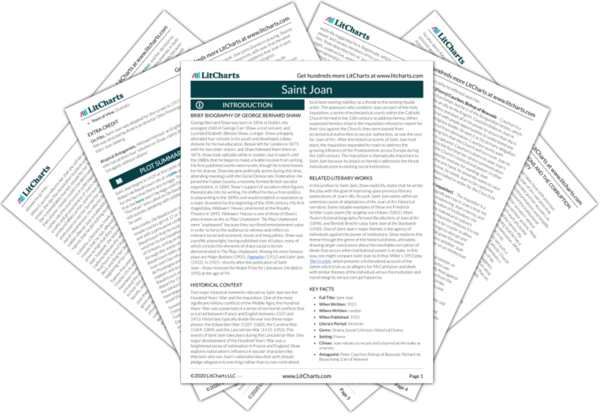Shaw evokes elements of the natural world to symbolize freedom from institutional bonds. While most characters in Saint Joan subscribe to ideologies espoused by institutions like the Church or the monarchy and justify their actions and worldviews in light of these institutions, Joan exists outside of institutional influence, choosing to operate in accordance with her personal, internal beliefs. As such, Shaw frequently connects Joan to the natural world. One example of this appears in Scene III, when Joan’s arrival at Orleans coincides with Dunois and his page observing kingfishers fly over the Loire river. By paralleling Joan’s arrival with the presence of kingfishers, Shaw emphasizes Joan’s ties to nature and her rejection of institutional power. More explicitly, in Scene VII, when Joan decides she would rather burn at the stake than spend the rest of her days in prison, she explains that while she can give up her military pursuits, armor, and renown, it is impossible for her to live without nature and freedom. Joan would rather suffer an excruciating death than spend the rest of her days cut off from nature, personal freedom, imprisoned in a literal institutional structure.
Nature Quotes in Saint Joan
“But to shut me from the light of the sky and the sight of the fields and flowers; to chain my feet so that I can never again ride with the soldiers nor climb the hills; to make me breathe foul damp darkness, and keep me from everything that brings me back to the love of God when your wickedness and foolishness tempt me to hate Him: all this is worse than the furnace in the Bible that was heated seven times. I could do without my warhorse; I could drag about in a skirt; I could let the banners and the trumpets and the knights and soldiers pass me and leave me behind as they leave the other women, if only I could still hear the wind in the trees, the larks in the sunshine, the young lambs crying through the healthy frost, and the blessed blessed church bells that send my angel voices floating to me on the wind.”










